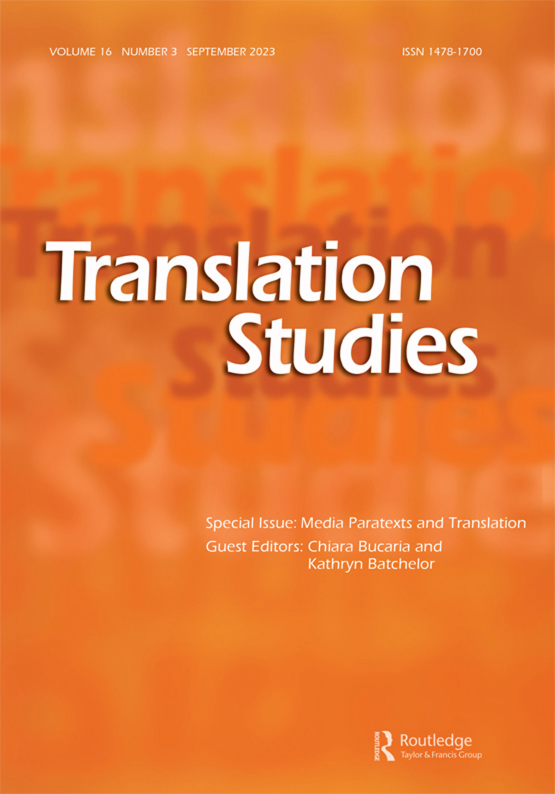Submit a Manuscript to the Journal
Translation Studies
For a Special Issue on
(De)constructing trust in high-stakes intercultural communication: theoretical, methodological and practical challenges
Abstract deadline
30 November 2023
Manuscript deadline
30 April 2024

Special Issue Editor(s)
Bei Hu,
National University of Singapore
[email protected]
Susana Valdez,
Leiden University
[email protected]
Valentina Ragni,
University of Warsaw
[email protected]
(De)constructing trust in high-stakes intercultural communication: theoretical, methodological and practical challenges
This special issue seeks to investigate the influence and practice of trust in various forms and manifestations of translation and interpreting activities. There is growing consensus that trust is paramount in high-stakes intercultural communication (Chesterman 1997/2016), notably in contexts such as conflict zones (Todorova and Ruiz Rosendo 2021), healthcare mediation (Federici 2021), asylum-seeking and humanitarian scenarios (Tipton 2010), interpreter-mediated police interviews (Perez and Wilson 2004) and sign-language interactions (Napier 2017). Of recent concern is the social implication of trust in technology-empowered translational communication (Vieira, Ragni, and Alonso 2021), specifically the uncertainties associated with the ever-evolving landscape of artificial intelligence and its impact on the translation profession and broader cultural relations.
However, barring a few exceptions (Edwards et al. 2005; Mesa 2000; Rizzi et al. 2019) mainly conducted in community interpreting, most research tends to address trust tangentially within broader discussions on the ethics of translation. Trust is often addressed via a bottom-up explanation, with scholars frequently omitting explicit articulation of their theoretical perspectives and methodological choices. Furthermore, there is a paucity of empirical research that directly investigates the processes of trust-building, signalling and maintenance as well as the impact of linguistic, historical and political mechanisms on trust within intercultural interactions.
This special issue aims to contribute towards building a comprehensive understanding of trust in translational activities, whereby translation also covers other modalities of intercultural communication such as spoken and signed interpreting, adaptation and localisation, while also providing methodological insights into the preconditions of trust within complex social causation. In order to broaden the epistemological and empirical scope of the on-going discourse on trust, we invite scholars to re-examine conventional notions by submitting proposals – in the form of conceptual papers, case studies and empirical research – that address the following suggested topics, among others:
- How does trust shape the dynamics of translation and interpreting, the power relations among various agents and the norms governing intercultural communication?
- To what extent and in what manner can trust (of various kinds) be built or rebuilt in translational activities?
- Under what circumstances, and with what consequences, does mistrust emerge within translation and interpreting systems?
- How does trust influence public response in crisis situations within multilingual contexts (e.g. the COVID-19 pandemic, humanitarian crises, climate emergencies)?
- Can translation and interpreting technologies enhance the level of trust in intercultural mediation, and if so, how?
- How does trust in translational activities impact the trust between cultures?
- How might excessive or blind trust increase risks and undermine the ultimate goal of achieving some level of cooperation in translational communication?
- How do factors like algorithmic bias, privacy concerns and reliance on machine-generated translations influence the trustworthiness of technologies in intercultural communication contexts?
- Which methodological and analytical approaches are suited for conducting in-depth analyses of trust-based intercultural interactions?
- How do translation and interpreting researchers conceptualise and employ trust within their research practice?
We encourage contributions that delve into these and related aspects, fostering a deeper understanding of the multifaceted nature of trust within translational contexts. By doing so, we aspire to enrich and motivate scholarly discussions on this emerging topic.
Looking to Publish your Research?
Find out how to publish your research open access with Taylor & Francis Group.
Choose open accessSubmission Instructions
Abstracts of up to 500 words (excluding references) for conceptual articles, case studies and empirical research should be sent to the guest editors at [email protected]; [email protected]; [email protected] by 31 November 2023.
Decisions on abstracts will be announced by 1 January 2024. Selected contributors will be invited to submit full articles for peer review by 30 April 2024. Submissions should be up to 8,000 words in length, in English (including abstract, notes and references). Detailed style guidelines are available at the journal's website.
Expected publication date: May 2025.